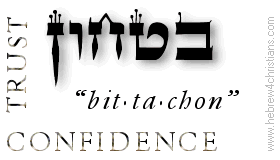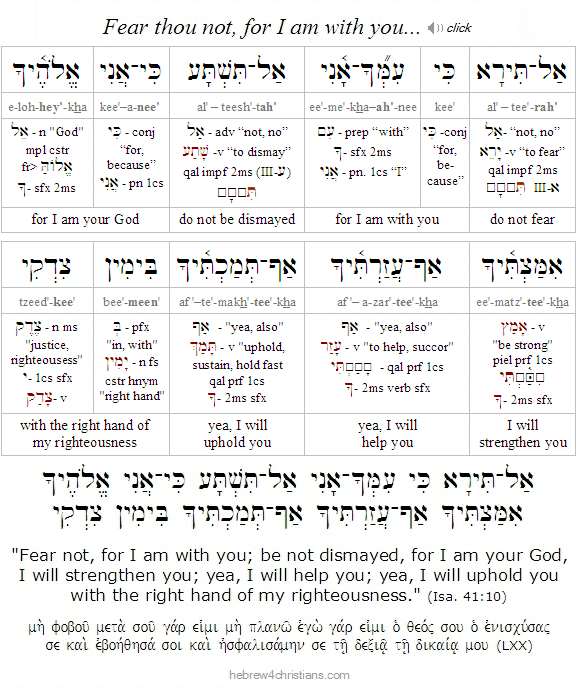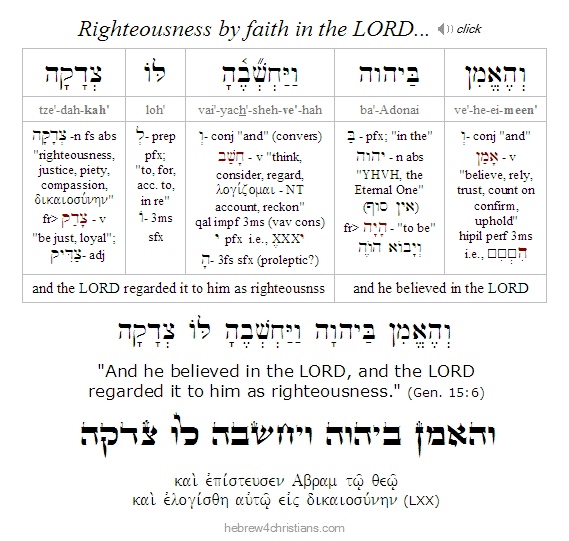|
Since our Torah portion this week (Shelach) tells the tragic story of how the Exodus generation lost their inheritance by believing the faithless report of the spies, I thought it would be helpful to review the nature of faith so that we might guard ourselves from stumbling in a similar way. After all, concerning the tragic decree of God regarding the fate of Israelites in the desert (see Num. 14:21-35), the New Testament admonishes Messianic pilgrims, "Let us therefore fear, lest, a promise being left us of entering into His rest, any of you should seem to come short of it" (Heb. 3:7-4:2).
The Hebrew word emunah (אֱמוּנָה), often rendered as "faith" in many English translations, comes from the root word aman (אָמַן), which means to rest securely or rely upon (and from which we get the word "amen"). The root word occurs for the first time in the Torah in connection with Abraham: "And he believed (וְהֶאֱמִן) the LORD, and He counted it to him as righteousness" (Gen. 15:6). But what was the nature of Abraham's faith that caused God to regard it as tzedakah (צְדָקָה) or "righteousness"? What was the "object" or "content" of his faith? Was it not that Abraham knew the character and will of God so intimately that he unconditionally put his trust in Him? Abraham was declared tzaddik (righteous) because he believed and understood that the LORD would fulfill His promise to him, despite his advanced age and the seeming impossibility of becoming the father of a multitude of nations (for more on this, click here). Abraham affirmed God's promise by saying the first "amen."
 |
Now while emunah has an intellectual aspect that understands God's attributes and character, it certainly goes beyond mere intellectual apprehension and assent (i.e., the idea of believing certain doctrines), since the "object" of faith is the Person of the Living God Himself. Therefore it is not inaccurate to say that emunah is more "belief in" than "belief that." The root word (aman) later appears when the Torah describes how Moses' arms were "steadied" by Aaron and Chur during the battle against Amalek (Exod. 17:12). Genuine faith is a settled intellectual conviction (ἔλεγχος) that what God has promised will indeed come to pass (Heb. 11:1). It accepts that God's verbal promise of our future good is reliable and sure. Abraham believed in a future state of affairs (a future-tense proposition) as expressed in his present faith in the Person and Promise of God. He foresaw the redemption of the world (the Messiah) and understood God's promise of salvation (John 8:56).
Hebrew Lesson:
Genesis 15:6 Hebrew reading (click):
If emunah describes the cognitive dimension of faith, the word bittachon (בִּטָּחוֹן) describes its emotional dimension. The word bittachon (בִּטָּחוֹן) comes from a root word (בָּטָח) that means to trust, to feel safe and secure. Bittachon describes emotional acceptance of the goodness of the LORD. Some of the sages have said that while emunah represents a state of understanding (בִּינָה) that God is intimately involved in all the events of the universe, bittachon means personally trusting in God in every situation for your good.... It is an intuitive awareness of the personal love of God for your life, coupled with complete trust that He cares for you (Rom. 8:28). It is an expectation that the lovingkindness (חֶסֶד) of God is for you, too. The ancient Greek translation of the Torah (i.e., the Septuagint) never translates words derived from this root in terms of merely "believing in God" (i.e., intellectual assent), but in terms of hoping or relying upon God's faithful love as the only true Source of hope. As the Psalms repeatedly state, the confidence that comes from relying upon God is valid only because of God's chesed (his loyalty or covenantal faithfulness). "On what do you rest this trust of yours (מָה הַבִּטָּחוֹן הַזֶּה אֲשֶׁר בָּטָחְתָּ)?" In other words, what is the source of your confidence?
Surely it is possible for a person to have emunah but not bittachon. This is the case of the mere "professor" of faith who does not know the LORD existentially within his or her heart. Theologians can "understand" that God exists, they can "assent" that He (alone) is the Creator of the universe who acts in justice, they can even claim that the Scriptures are true, and yet they can be in a state of profound spiritual darkness (James 2:19). Even the devil knows how to quote Scripture... On the other hand, it is also possible to have bittachon without emunah. This is the case of a gullible soul that is willing to accept any "wind of doctrine" even if it clearly contradicts the truth of the Scriptures. For example, people who stress the "sweetness and light" of God are often offended at the prospect of God's judgment for sin.... To be balanced, we need both emunah and bittachon - we need doctrine with heart, "spirit and truth" (John 4:23-24). We need to understand the attributes and character of the LORD (i.e., his Holy Name, his redeeming acts, etc.) as revealed in the propositional Scriptures, but we also need to let this truth of His Spirit penetrate our hearts so that we live genuinely in a state of peace, forgiveness, and love.
The head and the heart must work together. While emunah may be somewhat "conceptual" or "theoretical," bittachon is the practice of emunah into everyday life. It is "where we live," in the everyday world of temptation, struggles, heartache, and hope. Sometimes "intellectual" people need to make a radical break from the paradigms they have relied on to understand true spirituality. For example, the "problem of evil" can be regarded as an "academic question" until someone experiences great personal suffering... Indeed, the "head" can actually become a "defense" against the duty of heart to sympathize with others, to share in the pain and sorrow that is a ubiquitous aspect of life in this fallen world. It is one thing to think that you love other people, but it's quite another to actually do so, "down in the trenches," so to speak... It is all too easy to become self-deceived (Gal. 6:3). As the Apostle John admonished, "Little children, let us not love in word or talk but in deed and in truth" (1 John 3:17-18).
Thomas Aquinas' most significant work was his Summa theologiae or 'Summary of Theology,' a massive book that attempted to "systematize" all of Christian theology. He worked on it for many years, but when he was nearly finished he underwent a spiritual experience that, as he himself explained, made everything he had written "seem like straw." He thereafter gave up writing about "theology" after he encountered the Reality itself. Aquinas apparently moved from the realm of theoretical emunah to the realm of heartfelt bittachon. Similarly, toward the end of his life and career someone asked the prolific theologian Karl Barth if he could sum up all that he had learned and written. Barth thought a bit and replied, "Jesus loves me, this I know, for the Bible tells me so."
The Scriptures are "propositional" in their truth claims and therefore faith must be expressed in terms of emunah (i.e., as "theology"). However, the content of faith is not a static creed but calls for personal trust (bittachon) in the Living God who makes promises to those in existential need... All of this needs to be put in balance. Emunah must logically come first in the process, since we must first know about the true God before we can put our trust in Him... We must understand that "there is no other Name" for salvation given to us (Acts 4:12). After this, we begin learning to personally trust God in our daily lives. Yeshua gave us the proper order, "If you know these things, blessed are you if you do them" (John 13:17).
So do not yield to despair. Though our Torah portion this week warns us about the terrible sin of unbelief (Israel's unpardonable sin), "God is able to make all grace overflow (περισσεύω) to you, so that having all sufficiency in all things at all times, you may overflow (περισσεύω) in every good work" (2 Cor. 9:8). "Fear not, little flock, for it is your Father's good pleasure to give you the kingdom" (Luke 12:32). So "grow in grace and in the knowledge of our LORD and Savior, Yeshua the Messiah." Press on in faith, chaverim!
אַל־תִּירָא כִּי עִמְּךָ־אָנִי
אַל־תִּשְׁתָּע כִּי־אֲנִי אֱלֹהֶיךָ
אִמַּצְתִּיךָ אַף־עֲזַרְתִּיךָ
אַף־תְּמַכְתִּיךָ בִּימִין צִדְקִי
al tee·ra · kee · ee·me·kha - a·nee
al · teesh·ta kee - a·nee · e·lo·hey'·kha
ee·matz·tee'·kha · af - a·zar·tee'·kha
af - te·makh·tee'·kha · bee·meen · tzeed·kee

"Fear not, for I am with you; be not dismayed, for I am your God;
I will strengthen you, I will help you,
I will uphold you with my righteous right hand."
(Isaiah 41:10)


|






